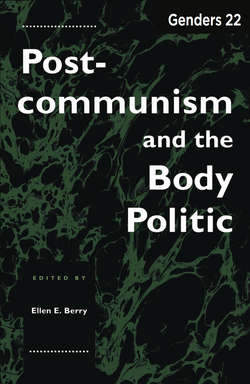Читать книгу Genders 22 - Ellen E. Berry - Страница 17
На сайте Литреса книга снята с продажи.
II. MOTHER RUSSIA: TAKE TWO
ОглавлениеIn 1992 the Russian emigré writer Fridrikh Gorenshtein published a short story entitled “Last Summer on the Volga” in the liberal journal The Banner (“Znavnia”). Gorenshtein, the author of a number of film scripts, including “Solarus” and “A Slave of Love,” began to attract critical attention in the former Soviet Union in 1991. “Last Summer on the Volga” provoked controversy because of its unattractive images of Russia.34 The narrator, who announces himself to be a Jew, and as such, forced into a condition of “rootlessness” by the surrounding Russian society, makes one last trip along the Volga before leaving for Berlin. The narrator finds himself surrounded by “symbols” of Russia in the form of two women whom he encounters. These symbols are quite similar to what we have already seen in Rasputin and Belov, but they are given an ironic twist. It is very likely that Gorenshtein refers to Rasputin and Belov indirectly in a scene in which the narrator goes to a restaurant occupied mostly by drunks, who, while realizing that he is not a “local,” do not reject him. The narrator comments “in the company of ‘Russian wisemen’ you can’t sit incognito.”35 In other words, the “Russian wisemen,” or Russian nationalists, always keep tabs on who is who, who is Russian, who is Jewish, and so forth. “Last Summer on the Volga” as a whole, as we will see, is a parodic response to the “village prose” and postvillage prose of Rasputin and Belov. While in the restaurant the narrator meets a pale blonde, reduced to begging. She eats food left on other people’s plates and lives in a shack along the river with a doll for company and a suitcase full of scraps of bread, which she eats with damp gray salt wrapped in a rag. Because of her pallor, and a “lifeless” sinful quality about her, the narrator compares her to a “rusalka.” The woman, Liuba, tells the narrator that she has served time in a prison camp for the murder of her mother-in-law, and that she is stranded in this small town on the Volga because she does not have enough money to return to her village and family. The narrator decides that Liuba, “the beggar rusalka,” is a symbol of all of Russia.
The second symbol is an old woman with nondescript features, “the kind you see many of and therefore don’t notice.” What makes this particular old woman so striking is the “enormous pig’s head” she holds against her chest, close to her own head. The pig’s head gives the old woman “individuality.” The narrator is “amazed” at the correspondence between the physical features and expression of the old woman and the pig. It strikes him that the old woman is the perfect image for Liuba’s mother-in-law, the “criminal-victim.” Furthermore the old woman with the pig’s head is a “second hypostasis of Russia, who tramples on and consumes everything around her … and in the first place, herself” (50). The narrator concludes that the traditional image of the Russian maiden meeting the “black limousines” of the government officials with bread and salt should be replaced by his two hypostases of the old woman, “Mother-in-Law Russia” carrying an aspic made of her own head, and Liuba, bringing her bread crusts and “damp gray salt.”
The grotesque old woman is at once perpetrator and victim, a Mother Russia, or, as Gorenshtein mockingly puts it, “Mother-in-Law Russia,” who feeds not Father Tsar or Father Stalin, but Father Apparatchik with her own flesh. The contrasts between Gorenshtein’s “Mother-in-Law Russia” and Rasputin’s Dar’ia are striking. Gorenshtein’s old woman destroys her home by goading her daughter-in-law to murder; Dar’ia is the conservator of hearth and home. Dar’ia is very nearly fleshless and belongs more to the spirit world of her ancestors than to the here and now. Gorenshtein’s Mother-in-Law is emphatically corporeal; her alter ego, the pig’s head, has features that “swim in fat.” In her self-destroying and self-rejuvenating fleshiness, Gorenshtein’s Mother-in-Law carnivalizes the saintly spirituality of the old women of village prose.
The final irony of Gorenshtein’s “Last Summer on the Volga” is turned against the narrator himself. The rusalka-beggar Liuba turns out not to be what he first thought. When at the end of the story the narrator unfolds the piece of paper on which “Liuba” has written her address, he finds only the name written over and over, with pictures of the sun, moon, clouds, and crosses. “Liuba” had been playing a part, the part she knew was expected of her: the criminal victim with the heart of gold. The narrator’s second “hypostasis of Russia” steps out of her prescribed role, at the same time masking her true identity. Gorenshtein’s rusalka remains a cipher, unlike the vicious child abusing rusalka of Belov’s Raising Children According to Dr. Spock. “Liuba” ultimately rejects the narrator’s literary stereotypes.36
